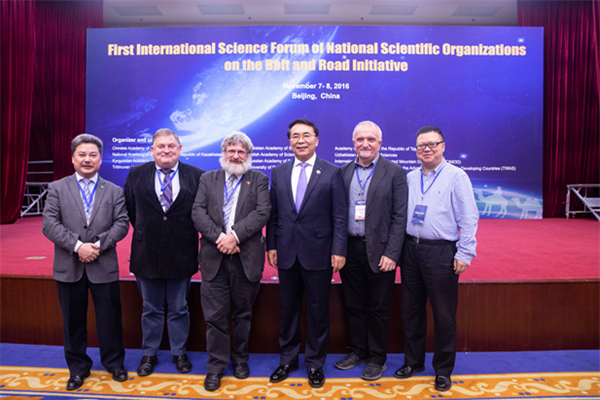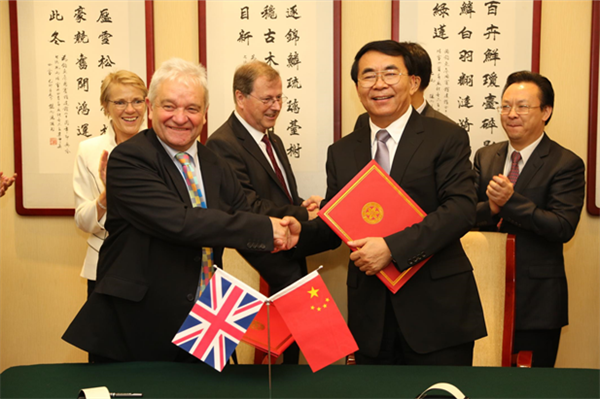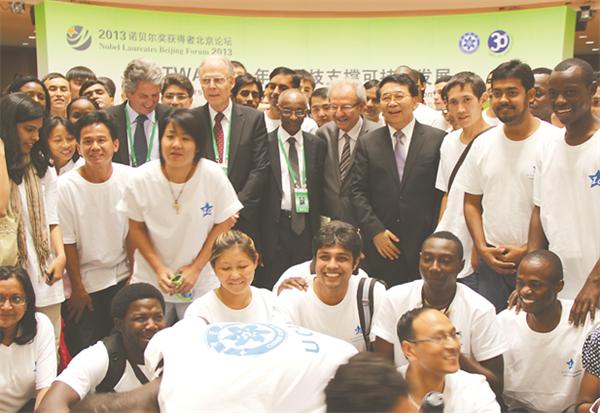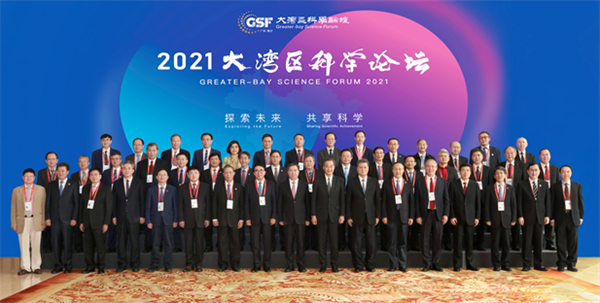Bai Chunli: China’s technological progress in the past ten years
The 2022 International Forum on South-South Cooperation and Trade in Services was held in Beijing on September 3. The attending guests shared their ideas on its theme "Shaping a Global Greener Future Through South-South Technical Cooperation".
Bai Chunli, president of the Alliance of International Science Organizations (ANSO), pointed out in his speech that the pandemic, extreme weather disasters and regional turmoil have brought huge pressure to global social development. ANSO will promote technological cooperation between countries so they can jointly cope with global challenges, share development opportunities with developing countries and contribute to the fulfillment of United Nations Sustainable Development Goals and the building of a Community with a Shared Future for Mankind.
Progress over ten years
"In the past ten years, China has been pushing forward an innovation-driven development strategy. China's Global Innovation Index has risen from the 34th in 2012 to 12th in 2021," Bai said, adding that China is making efforts to become a leading innovation-oriented country. At the same time, it has made many achievements in deepening international communication and cooperation in science and technology.
In September 2012, Bai, then president of the Chinese Academy of Sciences (CAS), was elected president of the World Academy of Sciences (TWAS), the first Chinese scientist to take the position. During his term from 2012 to 2018 Bai led a series of international programs and international development strategies at CAS, expanding the global network of science and technology cooperation and increasing the number of countries from which TWAS academicians come from 91 to 104.

The First International Science Forum of National Scientific Organization on the Belt and Road Initiative is held on November 7, 2016. Responsible persons of scientific research institutions from 22 countries, two Nobel Prize winners and more than 30 academicians from science academies of various countries attended the forum. [Photo/gsf.org.cn]
So far, the membership of ANSO has expanded from 37 to 67, drawn from 48 countries and regions with increasingly influence around the world. ANSO has initiated, organized and implemented 25 major international joint science programs, set up overseas partner fund projects and joined hands with institutions across more than 70 countries.
Technology goes abroad
As the largest developing country in the world, China pays great attention to South-South cooperation. "Since I was elected president of TWAS in September 2012, CAS has been carrying out an internationalization promotion strategy to deepen scientific and technological communication with other developing countries and promote international cooperation," Bai noted.
As the president of CAS and TWAS, Bai has shared the achievements of the two units in the past ten years. In response to the Belt and Road Initiative, CAS has carried out a series of forward-looking technological cooperative projects in such areas as biological medicine, health, biotechnology, water treatment technology, and clean energy technology, with significant progress made in those areas.

On September 13, 2013, Bai Chunli, then president of CAS, signs a joint statement with the president of the Royal Society. [Photo/gsf.org.cn]
Strengthening the building of international talents is important for pushing forward international communication and cooperation. Bai led CAS to promote the CAS President's International Fellowship Initiative (PIFI), which has become a globally influential brand project. The Sino-Danish College co-built by the University of the Chinese Academy of Sciences, a Danish education organ and eight Danish Universities have become an important platform for scientific and educational cooperation and communication between China and Denmark. Bai also launched a CAS-TWAS president's doctoral scholarship program to invite young scientific research talents from developing countries to study, train and attend seminars in China. The international scholarship funded by ANSO has attracted more than 1000 doctoral and master international students from over 100 countries, becoming an effective mechanism to attract and promote the flow of international talents.
CAS's establishing of an international cooperation and communication system enabled a large number of international top scientific talents to have high-level cooperation with CAS. "The American scientist K. Barry Sharpless, a Nobel Prize winner in chemistry and the Austrian physicist Anton Zeilinger, a Nobel laureate in physics, are both foreign academicians of CAS. Professor Zeilinger is an academician of TWAS as well," Bai added.
"Besides, we have set up 10 overseas science and education bases in Asia, Africa and Latin America and five CAS-TWAS centers in key fields such as water and environment, climate change, green technology and so on," Bai said, adding that overseas science and education bases have been given high attention by national leaders.

Bai Chunli attends the Nobel Laureates Beijing Forum 2013. [Photo/gsf.org.cn]
Building a high-level platform for global technological innovation
Bao noted that international technological cooperation is the trend of the times. "The Greater-Bay Science Forum provides a high-level platform of global scientific development and cooperation shared by government leaders of various countries, the world's top scientists, and famous international entrepreneurs and financiers," Bai said.

On December 11, 2021, Bai Chunli attends the Greater-Bay Science Forum. [Photo/gsf.org.cn]
Bai said that the globe is facing the challenges of climate change, energy resource shortages, food safety, network information security, major natural disasters, pandemics and poverty. Cooperation in science and technology is an inevitable choice to deal with the crises of mankind.
Bai hoped that the Greater-Bay Science Forum can be built as the "Davos of Technology" with international influence. In the future, it will gather global scientists and scientific organizations to enhance technological innovation and cooperation, share innovative achievements and break the barriers that restrict the flow of innovation factors such as knowledge, technology and talents, so that the achievements of scientific and technological innovation can be enjoyed by more of the world's peoples.












